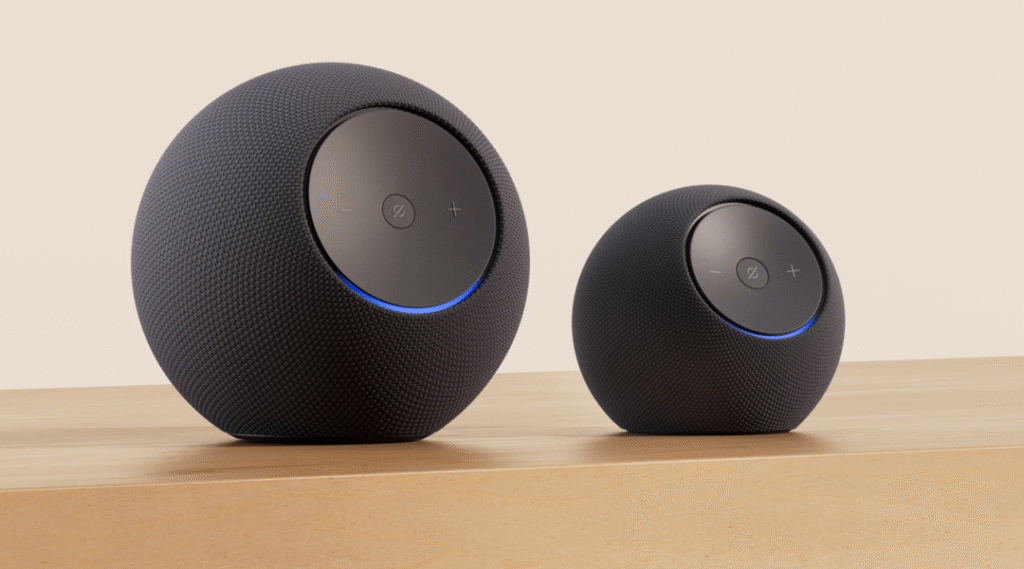Amazon’s latest update to its Echo lineup signals a bold step: pairing upgraded hardware with Alexa+, a next-generation AI assistant designed for more natural conversations and proactive help. The question is whether this move can push Amazon ahead of rivals Apple and Google in the race for smart home dominance.
Amazon’s latest strategy
The newest Echo devices come preloaded with Alexa+, which promises smoother, more human-like conversations, context retention, and the ability to handle multi-step requests. Hardware has also been refreshed with better chips, microphones, and acoustic designs to complement the AI push. Features like object recognition, voice-based automation creation, and smarter home reports are part of the package. For Prime members, Alexa+ is included at no extra cost, while other users may face a subscription tier.
Why Amazon could gain the lead
- Installed base advantage: Millions of Echo devices already sit in households, giving Amazon instant reach for its Alexa+ rollout.
- Tight hardware-software integration: Custom chips and in-house Echo design let Amazon fine-tune speed and responsiveness.
- E-commerce synergy: Alexa’s link to Amazon’s shopping and service ecosystem is unmatched in converting voice into real transactions.
- Agility in innovation: Amazon frequently experiments across devices (Echo Frames, Ring, Blink), showing willingness to push boundaries.
Obstacles Amazon must navigate
- Immaturity of “agentic” AI: Early testers note Alexa+ feels more conversational but not yet flawless. Multi-step tasks sometimes break down.
- Device support gaps: Older Echo models won’t run Alexa+, which may fragment the user base.
- Privacy concerns: Expanding AI capabilities raise fresh worries about home surveillance and data security.
- Rising competition: Apple is rumored to be revamping Siri and HomePod, while Google is embedding its Gemini AI into Nest devices.

Competitor landscape at a glance
| Factor | Amazon (Echo + Alexa+) | Apple (HomePod / Siri) | Google (Nest / Gemini) |
|---|---|---|---|
| Smart home presence | Broad Echo, Ring, Blink ecosystem | More limited, Apple device-centered | Strong Nest + Android reach |
| AI direction | Push toward proactive, multi-step AI agent | Siri still behind, upgrades pending | Gemini replacing Assistant with advanced AI |
| Commerce strength | Deep Amazon integration | Apple services focus | Ads/data-driven, less commerce focus |
| Privacy positioning | Scrutinized for data use | Strong privacy branding | Balancing AI power with trust issues |
| Challenges | AI maturity, device fragmentation | AI delays, fewer smart home devices | Migration from legacy Assistant |
Can Amazon really win?
Amazon has momentum: it is leaning into AI harder than it has in years, betting that Alexa+ can transform voice assistants into true digital agents. Its existing user base and commerce ecosystem give it a natural edge, especially if Alexa+ becomes reliable enough to handle daily tasks.
Yet, Apple’s reputation for user experience and privacy, combined with Google’s Gemini-powered ecosystem, means competition will intensify. For Amazon to truly pull ahead, it must execute flawlessly: delivering stable AI, ensuring user trust, and pushing broad adoption across households.
In short, Amazon’s new Echo devices and Alexa+ set the stage for a new era of smart assistants. Whether this leap allows Amazon to outpace Apple and Google depends not only on its innovations but also on how effectively it can turn early excitement into lasting user trust and everyday usefulness.
More articles for the similar topic:
Apple HomePod Comparison: Fidelity, Features, and Which to Choose
Choosing Between Size and Sound: Nest Mini vs Nest Audio
AR, AI, and VR Glasses: Who Will Be the Winner of the Next Computing Frontier
As for in-depth insight articles about AI tech, please visit our AI Tech Category here.
As for in-depth insight articles about Auto Tech, please visit our Auto Tech Category here.
As for in-depth insight articles about Smart IoT, please visit our Smart IoT Category here.
As for in-depth insight articles about Energy, please visit our Energy Category here.
If you want to save time for high-quality reading, please visit our Editors’ Pick here.




